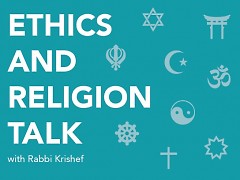Last week, we saw two Protestant and a Unitarian responses. This week we continue with Orthodox, Catholic, Hindu, and Jewish responses.
Father Michael Nasser, who writes from an Eastern Christian perspective and is Pastor of St. Nicholas Orthodox Christian Church, responds:
“The understanding that humanity was created in the image of God, as stated in Genesis 1:26 is one of the foundations of Orthodox Christianity. This means that all of creation in its original state is a reflection of God‘s beauty, truth and goodness, but only humanity was created to attain by His grace the fullness of all that God is by His nature. It does indeed mean that we ‘look’ like God but in way much more profound than physical appearance. We are like God in everything that God is: created to have the fullness of His wisdom, His goodness and His freedom. Because of this great potential, we Orthodox Christians see sin differently than Western Christians (Catholics and Protestants). Sin is not so much the breaking of a law or rule, but rather it is missing the mark on the immeasurable gift of the potential that God has offered humanity, uniquely created to be the only part of His creation made in His image. Each and every member of the human race has the potential to be the full expression of God Himself, and we believe Jesus Christ fulfilled that potential—revealing the Image of His Father, not only in His Divinity but also in His perfect humanity.”
Father Kevin Niehoff, O.P., a Dominican priest who serves as Adjutant Judicial Vicar, Diocese of Grand Rapids, responds:
“The foundation to this philosophical question is from Genesis 1:26, which reads, ‘then God said, let us make humankind in our image, according to our likeness…’ (Biblical Translation: New Revised Standard Version). Human beings are made up of two parts, body and soul. The soul is what gives human beings the ability to think, to reason, to know, and to act accordingly. In other words, human beings are capable of self-knowledge, of self-possession, and of freely giving of ourselves and entering into communion with other human beings.
“No, we do not physically look like God. However, our actions do reflect the divine and the Kingdom of God. In other words, the soul which can be described as the light in our eyes, shines forth in the communion of persons gathered together because it is the likeness of the divine persons, Father, Son and Holy Spirit, among themselves (Catechism of the Catholic Church, p. 425.)”
Fred Stella, the Pracharak (Outreach Minister) for the West Michigan Hindu Temple, responds:
“This quote is from the Judeo-Christian tradition. While nothing exactly like it appears in any Hindu scriptures that I am aware of we can draw on some of the great teachers of our tradition who have examined this through a Vedic lens. Taken literally, it makes little sense since we do not believe that God is not a cosmic person who in any resembles us. God is pure consciousness. Ultimately we are that as well. But during this mortal sojourn we must have an instrument with which to navigate this physical world. Hence, consciousness was able to evolve into what we are today, expressing ourselves through these bodies.”
My response:
Of course it does not mean we look like God! The theological conundrum is to puzzle out how we are created in the image of God, not to demonstrate how God is created in the image of human beings. The bible is full of descriptions of God’s human-like body parts and very human emotions because metaphor is the only way we can speak of God.
When Genesis speaks of ‘image of God,’ the context suggests a clear definition. The verse continue by giving human beings the unique quality of mastery over the the earth and everything in it. Human beings have a bit divine-like power to control the earth; to herd and train certain animals to work for them, to cultivate crops, to transform the raw material of the earth into materials to build and power human civilization. The Sabbath commandments are specifically intended to remind us that our mastery is limited.
Another possibility for the meaning of creation in the ‘image of God’ is based on the familiar Garden of Eden story in the following chapter of Genesis. Judaism does not believe that the sin of Adam and Eve introduced a permanent stain on humanity. In fact, when God banished them from the garden it was only because they had taken a step towards becoming like God and if they had stayed in the garden, they might have also eaten from the tree of life and lived forever (like God). It seems to me that God created human beings in God’s image, with the ability to make choices with complete free will. The expulsion was an inevitable consequence of being created in the image of God.
This column answers questions of Ethics and Religion by submitting them to a multi-faith panel of spiritual leaders in the Grand Rapids area. We’d love to hear about the ordinary ethical questions that come up on the course of your day as well as any questions of religion that you’ve wondered about. Tell us how you resolved an ethical dilemma and see how members of the Ethics and Religion Talk panel would have handled the same situation. Please send your questions to [email protected].
The Rapidian, a program of the 501(c)3 nonprofit Community Media Center, relies on the community’s support to help cover the cost of training reporters and publishing content.
We need your help.
If each of our readers and content creators who values this community platform help support its creation and maintenance, The Rapidian can continue to educate and facilitate a conversation around issues for years to come.
Please support The Rapidian and make a contribution today.
